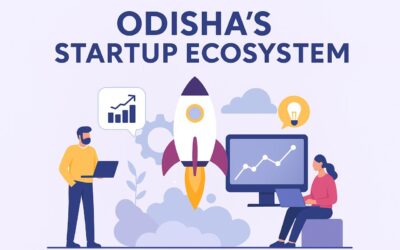Odisha’s Startup Revolution: Emerging Hub Faces Both Promise and Challenges

In the eastern corner of India, a quiet revolution is taking shape. Odisha, traditionally known for its ancient temples and mineral wealth, is now making headlines for a different reason – its burgeoning startup ecosystem. With over 1,300 registered startups and counting, the state is rapidly emerging as Eastern India’s answer to the country’s established startup hubs.
Odisha is rapidly evolving into a prominent startup hub in India, driven by progressive government policies, a vibrant entrepreneurial spirit, and growing investor confidence. With key sectors like technology, agriculture, healthcare, and renewable energy gaining momentum, the state is poised to play a crucial role in India’s startup landscape.
This article delves into Odisha’s startup policy, growth trajectory, challenges, opportunities, government recommendations, and its broader economic impact.
Odisha’s Startup Policy: A Catalyst for Growth
Odisha’s Startup Policy, introduced in 2016, aims to foster a robust entrepreneurial ecosystem, targeting the establishment of 5,000 startups by 2025. The policy provides financial incentives, including seed funding of up to ₹15 lakhs, tax exemptions, and incubation support. The Odisha Startup Hub (O-Hub) in Bhubaneswar acts as the central incubation center, supporting innovation and mentorship. Additional funding is available for women entrepreneurs and social impact startups. As of 2024, over 1,500 startups are registered in Odisha, marking a 200% increase in five years.
Bhubaneswar is home to over 60% of the state’s startups, while cities like Cuttack, Rourkela, and Berhampur are also emerging as entrepreneurial hubs.
Challenges Faced by Startups
However, beneath this promising surface lie significant challenges. Despite Bhubaneswar’s emergence as a startup hub, other cities lag behind in basic infrastructure. “Power supply and internet connectivity remain major concerns in tier-2 and tier-3 cities,” admits a senior government official who requested anonymity. “We’re working to address these gaps, but it’s a process that takes time.”
The talent pool presents another hurdle. Despite Odisha’s numerous technical institutions, many skilled professionals migrate to metropolitan cities, creating a persistent brain drain. Local startups often struggle to attract and retain top talent, particularly in specialized technical roles.
Despite its growth, Odisha’s startup ecosystem faces several hurdles:
- Funding Limitations: Only 20% of startups have secured venture capital or angel investments, hindering scalability.
- Talent Retention: Over 30% of skilled professionals migrate to metropolitan cities, citing better career prospects and infrastructure.
- Infrastructure Deficits: While Bhubaneswar boasts modern facilities, Tier-II cities lack advanced digital connectivity and coworking spaces.
- Regulatory Hurdles: Lengthy approval processes and bureaucratic delays impact business operations and growth timelines.
Opportunities for Growth
Yet, it’s not all challenges. Odisha’s unique positioning offers distinct advantages. The state’s strong agricultural base has spawned numerous agritech innovations. Companies like Farmery, a Bhubaneswar-based startup, are revolutionizing farm-to-consumer supply chains. In manufacturing, proximity to mineral resources has attracted Industry 4.0 solutions providers.
The tourism sector, too, presents untapped opportunities. With its rich cultural heritage and growing tourist footfall, the state offers fertile ground for travel-tech innovations. Several startups are already developing solutions for heritage tourism and hospitality management.
What sets Odisha apart is its cost advantage. Operating costs in Bhubaneswar are significantly lower than in metros like Bangalore or Mumbai, making it an attractive destination for bootstrapped startups. The state’s strategic location also provides excellent access to markets across Eastern India.
Looking ahead, experts believe Odisha needs to focus on three key areas: funding, skill development, and infrastructure. “While government support is commendable, we need more private investment,” says Debasish Patnaik, a local angel investor. “The ecosystem needs active angel networks and venture capital firms willing to bet on early-stage startups.”
The state government appears to be listening. Plans are underway to establish innovation hubs in tier-2 cities and create specialized training programs in collaboration with industry leaders. There’s also talk of a dedicated startup fund to address the funding gap.
For entrepreneurs like Priya Mishra, founder of a healthcare startup in Rourkela, these developments bring hope. “Five years ago, starting up in Odisha seemed like a distant dream. Today, we have the basic support system. Yes, challenges remain, but there’s a sense that things are moving in the right direction.”
As India’s startup ecosystem continues to evolve, Odisha’s emergence as a startup hub represents more than just regional growth – it’s a template for how tier-2 states can build vibrant entrepreneurial ecosystems. With continued focus on addressing infrastructure gaps, developing talent, and attracting investments, Odisha’s startup story might just be getting started.
The success of this transformation will depend not just on government initiatives but on the collective effort of all stakeholders – entrepreneurs, investors, educational institutions, and industry leaders. As one startup founder puts it, “Odisha is writing its own startup story, one that’s unique to its culture and context.”
Odisha’s diverse economy offers immense opportunities for startups:
- Agritech: With over 60% of the population engaged in agriculture, tech-driven solutions in precision farming, supply chain management, and agri-financing can drive transformation.
- Healthcare: Telemedicine, diagnostics, and healthcare delivery systems can bridge the rural-urban healthcare divide.
- Renewable Energy: Abundant natural resources create opportunities for solar, wind, and biomass energy startups.
- IT and AI: Bhubaneswar’s growth as an IT hub presents opportunities for startups to innovate in AI, cybersecurity, and data analytics.
Government Recommendations
To accelerate startup growth, the Odisha government should:
- Enhance Funding Access: Establish state-backed venture capital funds, incentivize angel investments, and provide tax benefits for investors.
- Expand Infrastructure: Develop technology parks, incubation centers, and coworking spaces beyond Bhubaneswar.
- Streamline Regulations: Simplify business registration and compliance processes to reduce time and costs.
- Foster Collaboration: Encourage partnerships between startups, academic institutions, and industries to drive innovation and knowledge-sharing.
Economic Impact
A thriving startup ecosystem can significantly boost Odisha’s economy by generating employment, attracting investments, and increasing state GDP. With enhanced government support, Odisha has the potential to become a leading startup destination in India, contributing to both regional and national economic growth.
Odisha’s startup ecosystem is on a promising trajectory, fueled by government initiatives and entrepreneurial innovation. By addressing challenges, leveraging opportunities, and fostering collaboration, the state can cement its position as a vibrant hub for startups, driving long-term economic and social development.
In the coming years, the state’s ability to address its challenges while building on its strengths will determine whether it can truly emerge as Eastern India’s startup capital. For now, the signs are promising, and the momentum is building.








